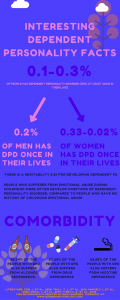Dependent personality disorder treatment options
People with dependent personality disorder (dependent PD or DPD) experience extreme feelings of helplessness, fear, and nervousness, have an extreme need to be taken care of, and need almost constant reassurance. Often, they are not aware of the fact that they have DPD and reach out for help for other (mental health) issues they can’t cope with themselves (depression or anxiety). Dependent personality disorder treatment is different than other personality disorder treatments, because there is a higher chance for the patient to become dependent on the therapist. Therefore it’s important that dependent personality disorder treatment is as short as possible, and that the therapist and client agree upon outside-of-session-restricted-contact-moments.
Jump to:
- What is dependent personality disorder?
- What causes people to develop DPD?
- How is dependent PD diagnosed and what are the symptoms?
- The dependent PD test.
- How to cope with DPD?
- Living with someone who has DPD.
- Interesting dependent PD facts.
- Online counseling for Dependent PD.
- Take me to the homepage.
At Barends Psychology Practice we offer (online) therapy for dependent personality disorder. Contact us to schedule a first, free of charge, online session. (Depending on your health insurance, treatment may be reimbursed).
Dependent personality disorder treatment – medication
In general mental disorders cannot be treated with medication alone, because medication treats its symptoms, but not the root of the problem. However, medication can reduce certain anxiety and depression related symptoms, which make it easier for a patient to practice in therapy. Regarding dependent personality disorder treatment medication can help reduce feelings of anxiety, panic, and depression, which make it easier for someone with Dependent PD to practice with new behaviour and to deal with childhood traumatic experiences.
A potential problem with medication is that people with dependent PD can get dependent on medication.
(Advertisement. For more information, please scroll down.)
Dependent personality disorder treatment – psychotherapy
Psychotherapy is more effective than medication as dependent personality disorder treatment, but not more effective than a combination of medication and psychotherapy. Although little research has been done regarding the effectiveness of both psychotherapy and medication for treating DPD, it’s clear that therapy would be counter-effective if the patient becomes dependent on the therapist. Therefore, it’s important to keep therapy as short as possible and to restrict outside-session-contact-moments.
Dependent personality disorder treatment focuses on:
- Childhood traumatic experiences: many people with DPD experienced some sort of abuse in their childhood, for instance neglect. These childhood experiences negatively affected the development of their self-esteem and self-image. Low self-esteem creates a need for reassurance and a feeling that you are not good enough (to do anything). It’s common for people with DPD to report memories in which their parents belittled them, criticized all they did and so on.
Sometimes EMDR treatment is applied to deal with childhood traumatic experiences. - Increasing self-esteem: by increasing their self-esteem, they learn to trust their own skills, thoughts and feelings, which decreases the need for reassurance and need for others to take care of them.
- Setting up behavioural experiments: behavioural experiments may seem very scary in the beginning, but are essential for people with DPD to experience that they can trust their own skills, feelings, emotions and decisions.
(Advertisement. For more information, please scroll down.)

